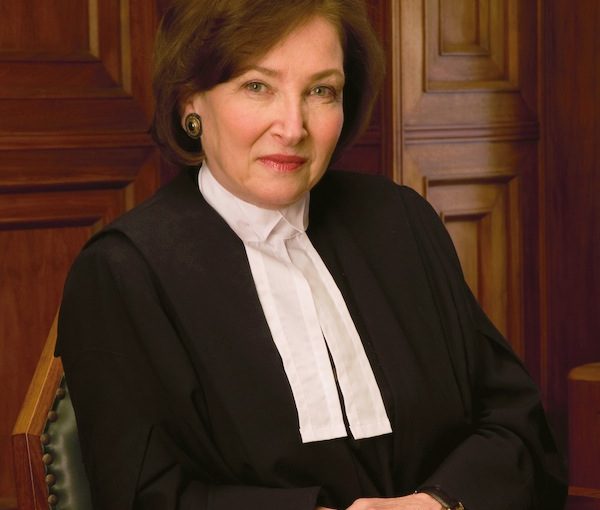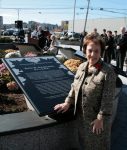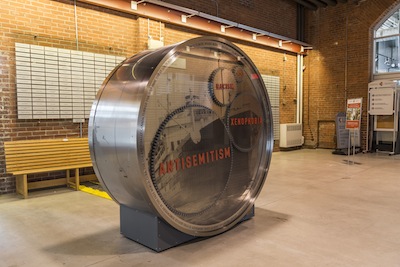On Dec. 9, the Honourable Rosalie Silberman Abella, a justice of the Supreme Court of Canada, delivered the inaugural Elie Wiesel Lectureship in Human Rights. (photo by Philippe Landreville)
The Honourable Rosalie Silberman Abella, a justice of the Supreme Court of Canada, last week delivered an emotional, scathing indictment of the world’s failures to live up to the promise of post-Holocaust human rights protections.
Abella, a daughter of Holocaust survivors who herself was born in a displaced persons camp in Germany, in 1946, delivered the inaugural Elie Wiesel Lectureship in Human Rights. She spoke Dec. 9 on the 72nd anniversary of the United Nations’ adoption of the Convention on the Prevention and Punishment of the Crime of Genocide and the day before the 72nd anniversary of the adoption of the Universal Declaration of Human Rights. The promise of those documents – and the justice represented by the Nuremberg trials of Nazi war criminals – has been betrayed and ignored, she said.
“These were the powerful legal symbols of a world shamefully chastened,” Abella said in the streamed virtual presentation. “But although Nuremberg represented a sincere commitment to justice, it was a commitment all too fleeting.”
As the West’s triumph over fascism gave way to conflict with communism, Germany transformed in the diplomatic imagination from an enemy conquered to a potential ally to be wooed, she said. Britain issued a communiqué to all Commonwealth countries to abandon prosecutions of Nazi war criminals.
“The past was tucked away and the moral comfort of the Nuremberg trials gave way to the moral expedient of the Cold War,” Abella said.
As the fight against communism eclipsed the fight for justice over past crimes, expedience led Western countries to welcome Nazi scientists and others to contribute to the military-industrial strategy – even as Jewish victims of Nazism, like Abella and her parents, sat stateless in DP camps.
To Abella, Nuremberg represented an acknowledgement of the failure of Western democracies to respond when they should have and could have.
“And so, the vitriolic language and venal rights abuses unrestrained by anyone’s conscience anywhere in or out of Germany turned into the ultimate rights abuse: genocide,” she said.
Some justice did in fact emerge in the aftermath of Nuremberg and remarkable progress has been made in some quarters, she said. “But we still have not learned the most important lesson of all – to try to prevent the abuses in the first place. All over the world, in the name of religion, domestic sovereignty, national interest, economic exigency or sheer arrogance, men, women and children are being slaughtered, abused, imprisoned, terrorized and exploited with impunity.… No national abuser seems to worry whether there will be a Nuremberg trial later because usually there isn’t. And, in any event, by the time there is, all the damage that was sought to be done has been done.”
Abella reflected on the preoccupation among jurists with the rule of law, noting that the atrocities of the Nazi era all took place legally under German laws. She said we should be focused on “the rule of justice, not just the rule of law.”
Itemizing the myriad genocides that have occurred since 1945, including ones happening now, Abella decried a lack of global will to confront atrocities before they occur.
“Clearly what remains elusive is our willingness as an international community to protect humanity from injustice,” she said, launching a broadside against the failures of the United Nations.
“It can hardly be said to have been the avatar of human rights we hoped it would be when it was created,” she said. “We changed the world’s institutions and laws after World War II because they had lost their legitimacy and integrity. Are we there again? Not so much because our human rights laws need changing, but because a good argument can be made that our existing global institutions, and especially the UN’s deliberative role, are playing fast and loose with their legitimacy and our integrity.”
She acknowledged the successes of some UN agencies, such as UNICEF, but lamented the body’s failures to meet its core objectives.
“The UN had four objectives: to protect future generations from war, to guard human rights, to foster universal justice and to promote social progress,” she said. “Since then, 40 million people have died as a result of conflicts all over the world. The UN eventually reacted in Libya and wagged its finger at Syria, but I waited in vain to wait to hear what it had to say about Iran, Venezuela and China, for example. Isn’t that magisterial silence a thunderous answer to those who say things would be a lot worse without the UN? Worse how? I know it’s all we have but does that mean it’s the best we can do? Nations debate, people die. Nations dissemble, people die. Nations defy, people die. We need more than the words and laws of justice. We need justice.”
Abella acknowledged the need to address climate change but suggested a moral climate crisis is upon us.
“We have to worry not only about how the climate is changing the world but how the moral climate is creating an atmosphere polluted by bombastic anti-intellectualism, sanctimonious incivility and a moral free-for-all,” she said. “Everyone is talking and no one is listening. We are rolling back hard-fought human rights for minorities, immigrants, refugees, workers and women.
Abella approached global justice through the eyes of a single family. Her parents were married in Poland on Sept. 3, 1939, the day the Nazis rolled over the border and as the Second World War began. Her parents spent four years in concentration camps. The brother she never knew was murdered at the age of two-and-a-half. The only survivors of her extended family were her parents and one grandmother.
“My life started in a country where there had been no democracy, no rights, no justice,” she said, struggling to maintain her composure. “No one with this history does not feel lucky to be alive and free. No one with this history takes anything for granted and no one with this history does not feel that those of us who are alive have a duty to wear our identities with pride and to promise our children that we will do everything humanly possible to keep the world safer for them than it was for their grandparents, a world where all children regardless of race, colour, religion or gender can wear their identities with dignity, with pride and in peace.”
Her own existence is a statement of the resilience of human hopefulness, she said.
“In an act that seems to me to be almost incomprehensible in its breathtaking optimism, my parents and thousands of other survivors transcended the inhumanity they had experienced and decided to have more children,” she said. “I think it was a way to fix their hearts and prove to themselves and the world that their spirits were not broken.”
Abella dedicated her lecture not only to Elie Wiesel, the late Nobel Peace Prize laureate, but also to Irwin Cotler, who introduced her prior to her presentation and who Abella called Wiesel’s “spiritual heir.”
Cotler, a former Canadian justice minister, is the founder and chair of the Raoul Wallenberg Centre for Human Rights, which sponsored the lecture along with faculties of law at McGill University and the Université de Montréal, the Lord Reading Law Society and the International Bar Association’s Human Rights Institute.
Cotler, who last month was appointed Canada’s special envoy on preserving Holocaust remembrance and combating antisemitism, noted that Abella was the youngest person ever appointed to the Canadian judiciary, at age 29.
“She was the first refugee ever appointed to the judiciary and she was the first Jewish woman ever appointed to the Supreme Court of Canada,” Cotler said, noting that he was the justice minister who nominated her to the highest court. “She has been a remarkable trailblazer. A quintessential Renaissance jurist, public intellectual, educator and judge.”
Among Abella’s recognitions, Cotler noted, are 39 honorary doctorates.
To watch the lecture, click here.



